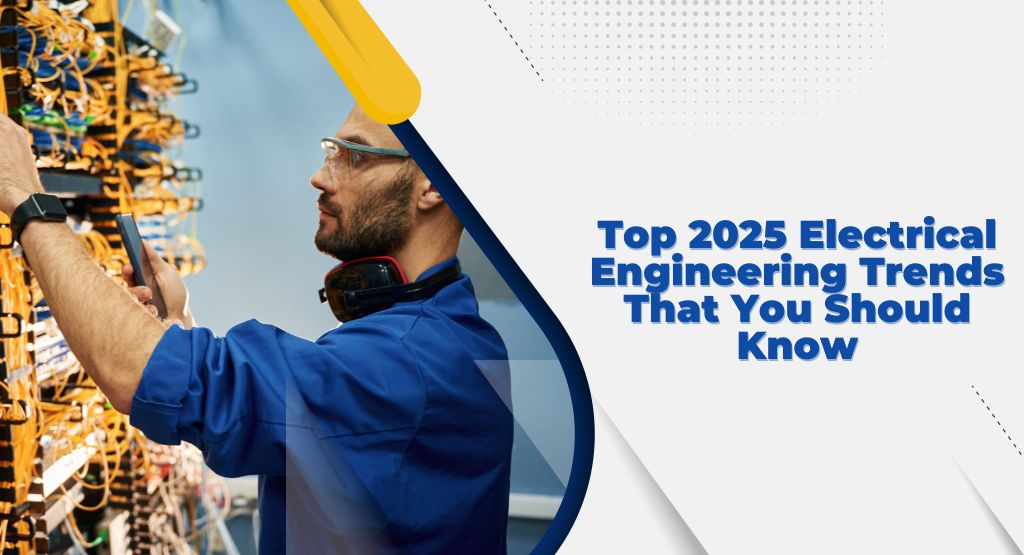Electrical engineering is transforming fast in 2025 with revolutionary changes in technology and intelligent systems. From renewable energy to automation and communication technology, engineers now address real-world issues with smarter, quicker, and more effective solutions. Learn the top 2025 Electrical Engineering Trends that you should know about—particularly if you’re contemplating a career in this exciting profession!.
Whether you’re already studying or going to undertake a B.Tech in Electrical Engineering in Rajasthan, knowing these trends will provide you with a head start. And if you are in search of a known institute to start off with, Poornima College of Engineering in Jaipur is a fine option to consider, with strong programs in electrical and communication engineering and engineering electronics.
1. Emergence of Smart Grids and IoT Integration
2025 is a major step towards IoT-based smart grid systems. These smart grids assist in energy flow management effectively using data analysis, sensors, and automation. With growing power needs and demand for renewable energy solutions, smart grids have emerged as a critical innovation.
As a student of electrical engineering, understanding how the IoT devices interact with energy systems will prove to be a key strength. Colleges like Poornima College of Engineering are already incorporating these technologies into lab practice and classroom teachings.
2. Green Energy Technologies
The worldwide concentration on sustainability is powering fast developments in renewable energy technologies. Solar panels, wind power turbines, and storage batteries are all being improved by engineers. EV charging networks and smart metering technologies are booming.
It is creating new professional avenues in green technology businesses for B.Tech students of Electrical Engineering from Rajasthan, particularly from green-oriented institutions like Poornima.
3. Machine Learning and Artificial Intelligence for Power Systems
AI and Machine Learning are no longer the exclusive domain of software—they’re transforming hardware as well. In 2025, electrical engineers are employing AI to control energy distribution, anticipate maintenance, and optimize performance.
Learning to apply AI to conventional electrical systems is becoming a part of the latest engineering electronics syllabus in forward-looking colleges such as Poornima College of Engineering.
4. Electric Vehicles and Power Electronics
India’s EV industry is on boom, and power electronics is at the center of EV development. Better converters, chargers, and energy management systems are needed to be designed by engineers. Hands-on training in this field as a student can make you extremely job-ready.
With dedicated laboratory facilities and practical training, Poornima trains students to work on actual EV technologies right from their first year.
5. Advanced Communication Systems
One of the expanding fields is electrical and communications engineering—a field that is of utmost importance when it comes to 5G and upcoming 6G technologies. Signal processing, wireless systems, and communication hardware innovations are growing at a tremendous rate.
Those who have a sound foundation in communications as well as electrical systems will have scope in telecom, defence, aerospace, and satellite sectors.
6. Cybersecurity in Electrical Infrastructure
As power systems increasingly become digital, the demand for cybersecurity has never been more critical. From smart homes through to industrial control systems, engineers today have a responsibility to protect against data breaches and system crashes.
Institutions such as Poornima are implementing multidisciplinary electives that combine electrical engineering with cybersecurity consciousness—readying students for future challenges.
Why Poornima College of Engineering?
Based in Jaipur, Poornima College of Engineering provides an industry-focused curriculum in electrical and communication engineering with focus on industry-related skills. Equipped with dedicated laboratories, industry-experienced faculty, and strong industry connections, Poornima offers the ideal platform for students to learn and experiment according to the latest Electrical Engineering Trends.
If you are thinking of pursuing a B.Tech in Electrical Engineering in Rajasthan, Poornima’s offering is designed to address the latest industry requirements—ranging from AI-based systems to renewable energy solutions.
Final Thoughts
The year 2025 is going to be an interesting time for electrical engineering with technologies and industry demands changing at a rapid pace. Keeping abreast of these trends, students and young engineers can equip themselves to fit their education and capabilities into the future of the discipline.
Poornima College of Engineering not only stays abreast of these advancements but also invites students to explore them in practice. If you are enthusiastic about sustainable energy, intelligent systems, or new technologies of communications, this is the perfect moment to start your career in engineering.
Read More Blogs – How PIET Jaipur Empowers Smart Students for their Dream Careers?

